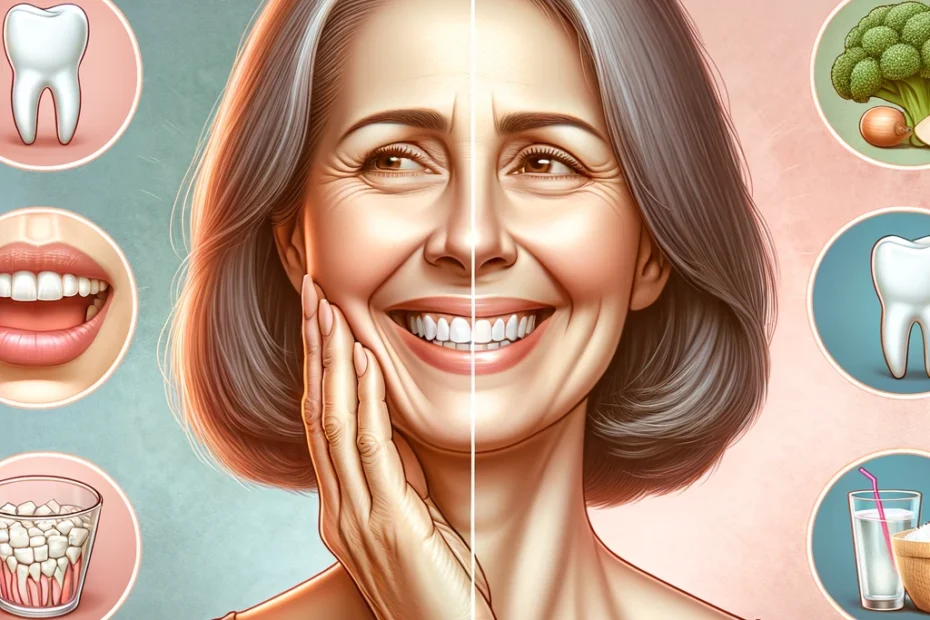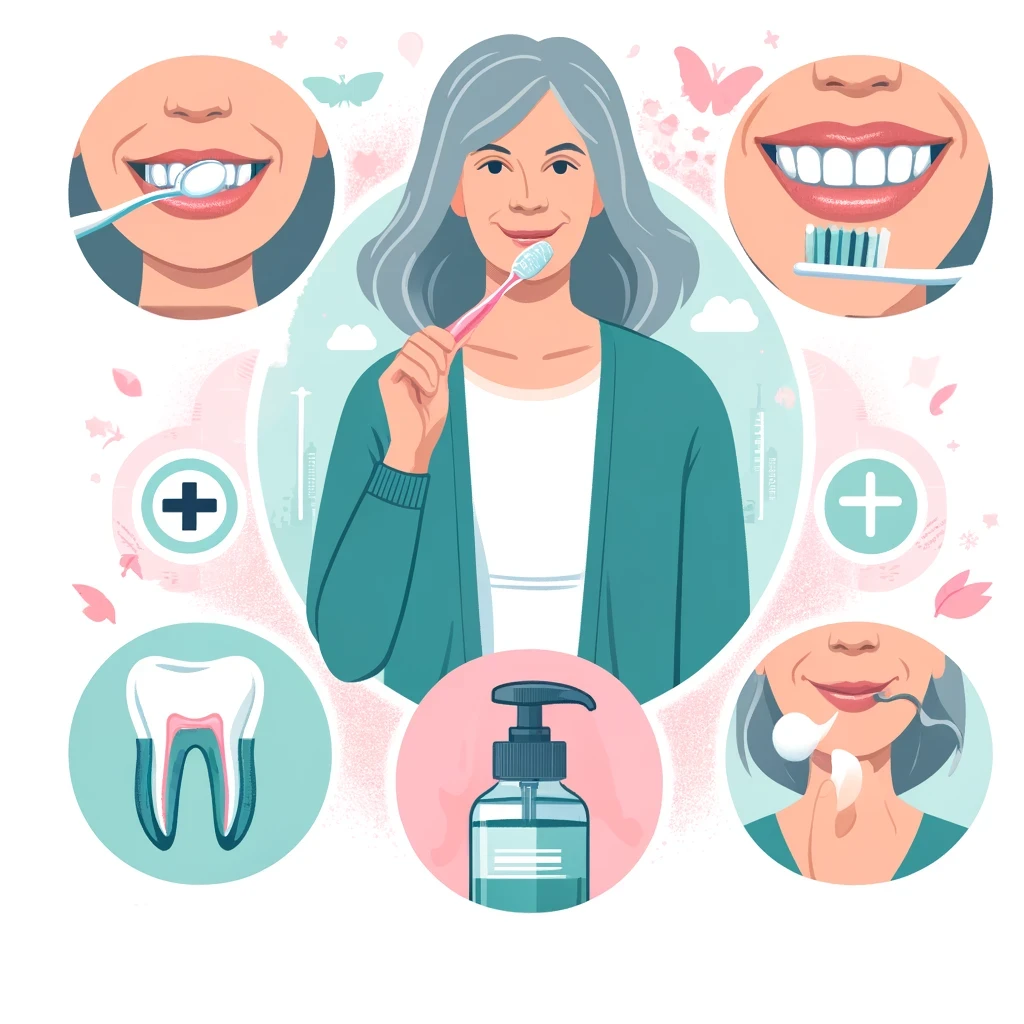Menopause is a profound transition in a woman’s life, often accompanied by a host of unwelcome symptoms that disrupt daily life. Among the most overlooked yet significantly impactful are the changes it brings to oral health.
Menopause is a natural biological process signifying the end of a woman’s reproductive years, typically occurring in the late 40s to early 50s. This transition brings about many physiological changes, many of which are well-documented, such as hot flashes and mood swings.
Understanding the interplay between menopause and oral health is crucial for maintaining overall well-being during this significant life stage.
Hormonal Changes and Their Impact on Oral Health
Menopause is characterized by a decline in estrogen levels, a hormone pivotal for various bodily functions. The reduction in estrogen affects the oral cavity, leading to a series of changes.
Estrogen receptors are present in oral tissues, and their decreased stimulation can result in reduced salivary flow, altered oral mucosa, and changes in bone density. These hormonal fluctuations can create a conducive environment for the development of oral health issues, making it imperative to address these changes proactively.
Common Oral Health Issues During Menopause
Several oral health issues are prevalent during menopause, including xerostomia (dry mouth), periodontal disease, and burning mouth syndrome.
Xerostomia (Dry Mouth)
- Xerostomia results from diminished salivary production, a common occurrence due to reduced estrogen levels. Saliva is crucial in maintaining oral health by neutralizing acids produced by bacteria, aiding digestion, and keeping the mouth moist.
- Symptoms include a sticky, dry feeling in the mouth, frequent thirst, sores, and cracked lips. These symptoms can lead to difficulties in speaking, eating, and swallowing.
- The lack of saliva increases susceptibility to dental caries (cavities) because it reduces the natural cleansing of the teeth and gums. This can result in a higher incidence of tooth decay and gum disease.
Periodontal Disease
- Periodontal disease, or gum disease, becomes more pronounced during menopause due to hormonal imbalances affecting the gingival tissues. Estrogen helps maintain the integrity of the gum tissues, and its decline can lead to increased inflammation and infection.
- Periodontal disease symptoms include inflammation, redness, bleeding gums, bad breath, and loose teeth. If left untreated, it can lead to tooth loss.
- The condition is exacerbated by the decrease in bone density associated with menopause, which can weaken the structures supporting the teeth.
Burning Mouth Syndrome
- Burning mouth syndrome (BMS) is characterized by a chronic burning sensation in the mouth, affecting the tongue, lips, gums, and palate. It is a complex condition that can significantly impair the quality of life.
- Symptoms include a burning, scalding, or tingling sensation that may vary in intensity throughout the day. It is often accompanied by a dry mouth and altered taste sensations.
Preventive Measures and Treatments
Preventive measures play a pivotal role in mitigating the oral health challenges posed by menopause. Maintaining meticulous oral hygiene practices, including regular brushing with fluoride toothpaste and flossing, is essential.
- Maintaining meticulous oral hygiene practices is essential. Regular brushing with fluoride toothpaste helps strengthen tooth enamel and prevent decay. Flossing daily removes plaque and food particles from between the teeth, reducing the risk of gum disease.
- Using antimicrobial mouthwashes can help manage bacterial load in the oral cavity, further protecting against periodontal disease and other infections.
- For those experiencing xerostomia, saliva substitutes and hydrating mouthwashes can provide relief. Chewing sugar-free gum or sucking on sugar-free lozenges can stimulate saliva production.
- It is crucial to stay well-hydrated by drinking plenty of water throughout the day. Avoiding alcohol, caffeine, and tobacco, which can exacerbate dry mouth, is also recommended.
- Hormone replacement therapy (HRT) has been suggested to alleviate some oral health issues by stabilizing estrogen levels. HRT can help reduce symptoms of dry mouth and improve the overall condition of oral tissues.
Importance of Regular Dental Check-ups
Regular dental check-ups are indispensable during menopause. Dental professionals can detect early signs of oral health issues and provide timely interventions. Professional cleanings help control plaque and tartar buildup, reducing the risk of periodontal disease.
Dentists can also offer personalized advice on managing menopause-related oral health problems and recommend suitable treatments. Establishing a consistent schedule for dental visits ensures that any emerging issues are promptly addressed, thereby maintaining optimal oral health.
Lifestyle and Dietary Recommendations
Adopting a healthy lifestyle and balanced diet can significantly influence oral health during menopause. Consuming a diet rich in calcium and vitamin D supports bone health, which is crucial as the risk of osteoporosis increases during menopause.
Hydration is key in combating dry mouth, so drinking plenty of water is advised. Avoiding tobacco and limiting alcohol consumption can prevent the worsening of oral health issues. Incorporating foods with anti-inflammatory properties, such as leafy greens and fatty fish, can help maintain oral and systemic health.
Include fortified foods such as orange juice, cereals, and plant-based milk alternatives to ensure adequate intake of these nutrients. Eat water-rich fruits and vegetables like cucumbers, watermelons, and oranges to boost hydration levels. Minimize the consumption of sugary snacks and drinks that can lead to cavities and gum disease. Aim for balanced meals that include a variety of nutrients to support overall health and well-being.
Conclusion
Menopause is a transformative phase that necessitates a proactive approach to health, including oral well-being. By understanding the hormonal impacts, recognizing common oral health issues, and implementing preventive and therapeutic measures, women can confidently navigate this period.
Regular dental check-ups and lifestyle adjustments enhance oral health, improving overall quality of life. Embracing these strategies ensures that oral health remains robust during menopause, paving the way for a healthy and fulfilling life.

Dr. Orion Johnson is a dedicated and compassionate dentist committed to providing exceptional dental care to his patients.Dr. Johnson obtained his Doctor of Dental Surgery (DDS) degree from a prestigious dental school, where he excelled academically and clinically. He is licensed to practice dentistry and stays updated with the technology through continuing education and training.

